Khám phá không gian vũ trụ luôn là một trong những chủ đề hấp dẫn và thường xuyên xuất hiện trong IELTS Writing Task 2. Với chi phí khổng lồ và tầm quan trọng toàn cầu, câu hỏi về việc các quốc gia có nên hợp tác trong lĩnh vực này hay không đã trở thành một đề tài tranh luận phổ biến trong các kỳ thi IELTS gần đây.
Bài viết này sẽ cung cấp cho bạn một phân tích toàn diện về chủ đề “Should Countries Collaborate On Space Exploration”, bao gồm 3 bài mẫu ở các band điểm khác nhau (5-6, 6.5-7, 8-9), phân tích chi tiết điểm mạnh và điểm yếu của từng bài, cùng với kho từ vựng và cấu trúc câu quan trọng giúp bạn đạt điểm cao.
Qua nghiên cứu các đề thi thực tế từ British Council và IDP, chúng tôi đã xác định được những câu hỏi phổ biến về chủ đề này:
- “Some people believe that money spent on space exploration is a waste and should be used for other purposes. To what extent do you agree or disagree?” (xuất hiện tháng 3/2023)
- “International cooperation in space exploration is essential for humanity’s future. Discuss both views and give your opinion.” (xuất hiện tháng 8/2023)
- “Should countries work together or compete in space exploration?” (xuất hiện tháng 11/2023)
Trong bài viết này, chúng ta sẽ tập trung phân tích đề bài Discussion (Discuss both views) – một trong những dạng đề phổ biến nhất và khó nhất đối với học viên Việt Nam.
Đề Writing Part 2 Thực Hành
Some people think that space exploration should be carried out by individual countries, while others believe that international collaboration is more beneficial. Discuss both views and give your own opinion.
Dịch đề: Một số người cho rằng việc khám phá không gian nên được thực hiện bởi từng quốc gia riêng lẻ, trong khi những người khác tin rằng hợp tác quốc tế sẽ có lợi hơn. Thảo luận cả hai quan điểm và đưa ra ý kiến của bạn.
Phân tích đề bài:
Đây là dạng câu hỏi Discussion (Discuss both views) – yêu cầu thí sinh phải:
- Trình bày và giải thích quan điểm thứ nhất (individual countries)
- Trình bày và giải thích quan điểm thứ hai (international collaboration)
- Đưa ra ý kiến cá nhân rõ ràng
Các thuật ngữ quan trọng cần hiểu:
- Space exploration: Hoạt động khám phá, nghiên cứu không gian vũ trụ
- Individual countries: Các quốc gia riêng lẻ, độc lập
- International collaboration: Sự hợp tác giữa các quốc gia
Những lỗi thường gặp của học viên Việt Nam:
- Chỉ tập trung vào một quan điểm, bỏ qua quan điểm còn lại
- Không đưa ra ý kiến cá nhân rõ ràng
- Viết quá chung chung, thiếu ví dụ cụ thể
- Sử dụng từ vựng không học thuật (big, good, bad…)
- Lỗi ngữ pháp về mạo từ và thì động từ
Cách tiếp cận chiến lược:
- Introduction: Paraphrase đề bài + nêu rõ bài sẽ thảo luận cả hai quan điểm
- Body 1: Lý do tại sao các quốc gia nên khám phá không gian độc lập (2-3 lý do với ví dụ)
- Body 2: Lý do tại sao hợp tác quốc tế có lợi hơn (2-3 lý do với ví dụ)
- Conclusion: Tóm tắt và nêu rõ quan điểm cá nhân (nên chọn một trong hai hoặc có thể kết hợp)
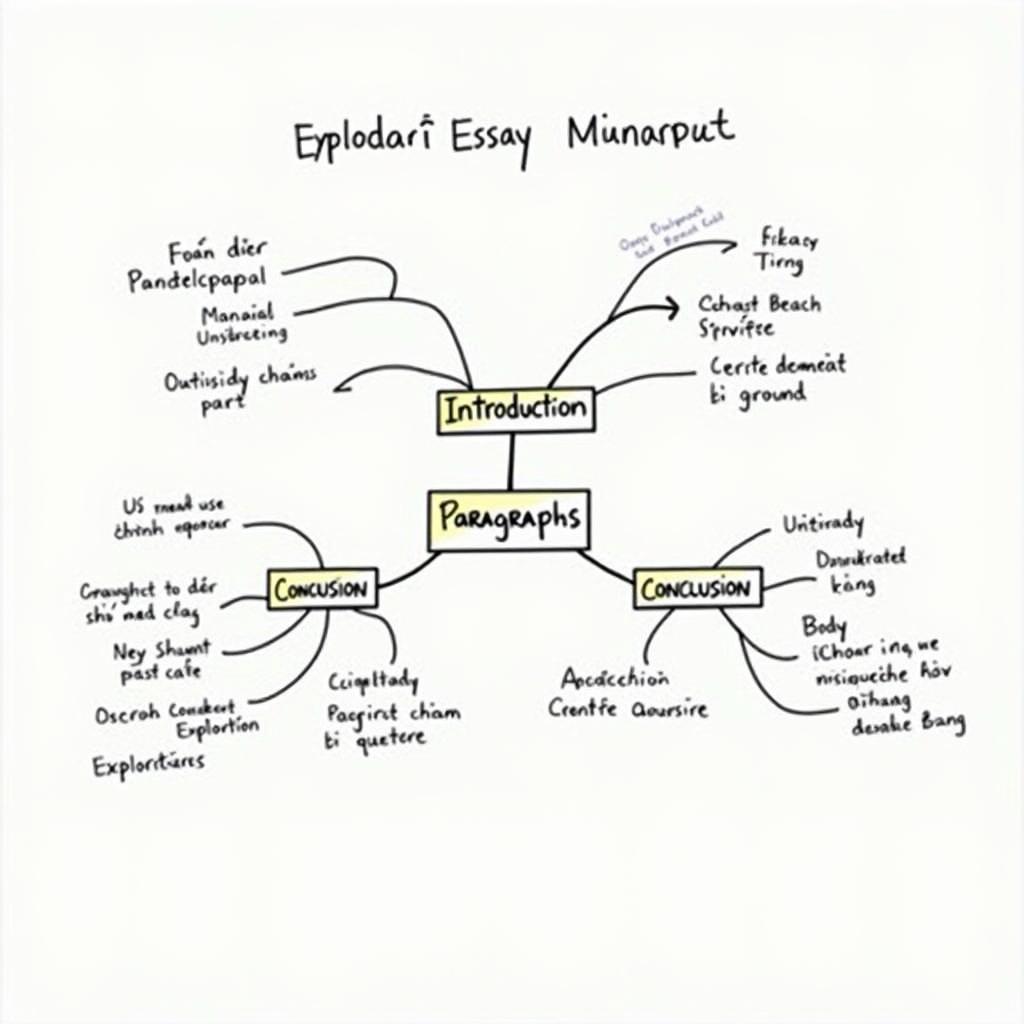 Sơ đồ tư duy chiến lược làm bài IELTS Writing Task 2 về chủ đề khám phá không gian vũ trụ và hợp tác quốc tế
Sơ đồ tư duy chiến lược làm bài IELTS Writing Task 2 về chủ đề khám phá không gian vũ trụ và hợp tác quốc tế
Bài Mẫu Band 8-9
Bài viết ở band 8-9 thể hiện sự vượt trội về cả 4 tiêu chí chấm điểm: hoàn thành xuất sắc yêu cầu đề bài, mạch lạc và liên kết tự nhiên, từ vựng phong phú và chính xác, cũng như ngữ pháp đa dạng với rất ít lỗi sai. Bài viết dưới đây sẽ minh họa những đặc điểm này.
The question of whether space exploration should be pursued independently by nations or through international cooperation has become increasingly relevant in recent decades. While there are valid arguments for maintaining national autonomy in space programmes, I believe that collaborative efforts yield far greater benefits for humanity as a whole.
Those who advocate for individual national space programmes often emphasize the importance of sovereignty and technological independence. When countries develop their own space capabilities, they maintain complete control over sensitive technologies and strategic information, which could be crucial for national security. Furthermore, independent programmes can foster national pride and inspire domestic innovation, as exemplified by India’s Mars Orbiter Mission in 2014, which demonstrated the country’s growing technological prowess at a fraction of the cost of similar Western missions. Additionally, nations pursuing their own space agendas are not constrained by the bureaucratic complexities and political disagreements that often plague international collaborations.
However, the advantages of international cooperation in space exploration are considerably more compelling. Firstly, the astronomical costs associated with space missions can be distributed among participating nations, making ambitious projects financially feasible. The International Space Station, with contributions from fifteen countries, stands as a testament to what can be achieved when resources are pooled. Secondly, collaborative ventures enable the sharing of expertise and technology, accelerating scientific progress. When NASA collaborates with the European Space Agency or Japan’s JAXA, each organization brings unique capabilities and knowledge, resulting in more sophisticated missions than any single nation could accomplish alone. Most importantly, space exploration addresses challenges that transcend national boundaries, such as asteroid detection, climate monitoring, and the search for extraterrestrial life, which naturally lend themselves to collective endeavours.
In conclusion, whilst individual space programmes have their merits in terms of autonomy and national achievement, the scale and complexity of modern space exploration necessitate international collaboration. Given the shared benefits and universal significance of discoveries made in space, I firmly believe that nations should prioritize cooperative approaches over competitive ones.
Số từ: 318
Phân Tích Band Điểm
| Tiêu chí | Band | Nhận xét |
|---|---|---|
| Task Response (Hoàn thành yêu cầu) | 9.0 | Bài viết trả lời đầy đủ và cân bằng cả hai quan điểm với độ sâu phân tích ấn tượng. Ý kiến cá nhân rõ ràng và được duy trì xuyên suốt bài. Các ví dụ cụ thể (India’s Mars Orbiter Mission, ISS) tăng tính thuyết phục. |
| Coherence & Cohesion (Mạch lạc & Liên kết) | 9.0 | Cấu trúc bài logic và mạch lạc với sự phát triển ý tưởng tự nhiên. Sử dụng đa dạng linking devices (While, Furthermore, However, Firstly, Most importantly) không gượng ép. Mỗi đoạn có topic sentence rõ ràng và supporting ideas được phát triển tốt. |
| Lexical Resource (Từ vựng) | 9.0 | Từ vựng học thuật phong phú và chính xác (sovereignty, autonomy, astronomical costs, transcend boundaries, extraterrestrial life). Collocations tự nhiên (foster innovation, plague collaborations, pooled resources). Không có lỗi từ vựng đáng chú ý. |
| Grammatical Range & Accuracy (Ngữ pháp) | 9.0 | Sử dụng đa dạng cấu trúc câu phức với độ chính xác cao: mệnh đề quan hệ, câu điều kiện ẩn, phân từ, câu nhấn mạnh. Các lỗi sai (nếu có) rất nhỏ và không ảnh hưởng đến ý nghĩa. Câu văn trôi chảy và tự nhiên. |
Các Yếu Tố Giúp Bài Này Được Chấm Điểm Cao
-
Câu mở bài học thuật và tinh tế: Sử dụng cụm “has become increasingly relevant” thay vì cách viết thông thường như “is important nowadays”, thể hiện trình độ ngôn ngữ cao.
-
Position rõ ràng ngay từ đầu: Tác giả không chỉ nêu sẽ thảo luận cả hai quan điểm mà còn cho biết rõ quan điểm cá nhân nghiêng về phía nào (“I believe that collaborative efforts yield far greater benefits”).
-
Sử dụng concession hiệu quả: Cụm “While there are valid arguments for…” thể hiện khả năng nhìn nhận khách quan vấn đề trước khi đưa ra quan điểm, đây là dấu hiệu của critical thinking – yếu tố quan trọng ở band 8-9.
-
Ví dụ cụ thể và relevant: India’s Mars Orbiter Mission (2014) và International Space Station không chỉ là ví dụ thực tế mà còn được tích hợp mượt mà vào luận điểm, không gây cảm giác “nhồi nhét”.
-
Từ vựng topic-specific chính xác: Các cụm như “technological prowess”, “astronomical costs”, “transcend national boundaries”, “extraterrestrial life” cho thấy kiến thức chuyên sâu về chủ đề và khả năng sử dụng từ vựng học thuật tự nhiên.
-
Cấu trúc câu đa dạng và phức tạp: Bài viết kết hợp nhiều loại câu: câu phức với nhiều mệnh đề, câu sử dụng phân từ (“Given the shared benefits…”), câu nhấn mạnh bằng cấu trúc it-cleft tiềm ẩn.
-
Kết bài tái khẳng định position mạnh mẽ: Sử dụng “I firmly believe” và tổng kết lại lý do chính, tạo ấn tượng cuối cùng tốt với giám khảo.
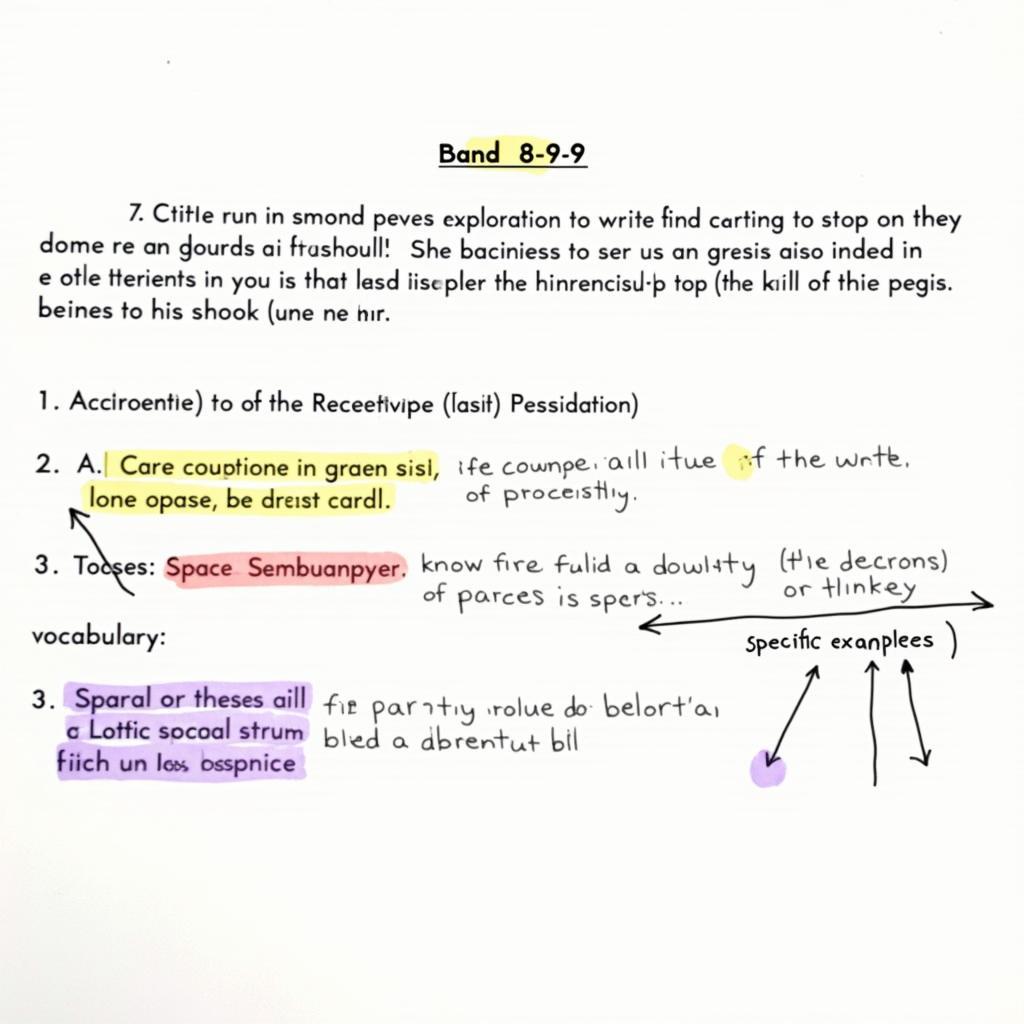 Phân tích chi tiết cấu trúc và điểm mạnh của bài mẫu IELTS Writing Task 2 band 8-9 về hợp tác không gian
Phân tích chi tiết cấu trúc và điểm mạnh của bài mẫu IELTS Writing Task 2 band 8-9 về hợp tác không gian
Bài Mẫu Band 6.5-7
Bài viết ở band 6.5-7 thể hiện khả năng sử dụng tiếng Anh tốt với ý tưởng rõ ràng, tuy nhiên vẫn còn một số hạn chế về độ tinh tế trong diễn đạt và độ sâu phân tích so với band 8-9.
The debate over whether countries should explore space on their own or work together internationally is a hot topic these days. Both approaches have their own advantages and disadvantages, which I will discuss in this essay before giving my personal view.
On the one hand, there are several reasons why some people support independent space exploration by individual countries. Firstly, when a country has its own space program, it can protect important technologies and secrets. This is particularly important for national defense and security purposes. Secondly, having a successful space mission can make citizens feel proud of their country. For example, when China successfully landed a rover on the far side of the moon, it boosted national confidence significantly. Finally, countries can make decisions faster without having to negotiate with other nations about every detail of a mission.
On the other hand, international cooperation in space exploration brings many important benefits. The most obvious advantage is that space missions are extremely expensive, and when countries work together, they can share the costs. This means more missions can be carried out with the same amount of money. Moreover, different countries have different strengths in technology and science, so collaboration allows them to combine their expertise. The International Space Station is a perfect example of successful cooperation, where astronauts from various countries work together. Additionally, space exploration deals with issues that affect all humanity, such as finding new planets for future colonization or detecting dangerous asteroids.
In conclusion, although individual space programs have some benefits in terms of security and national pride, I believe that international collaboration is more advantageous because it makes expensive projects more affordable and helps humanity achieve greater goals together.
Số từ: 292
Phân Tích Band Điểm
| Tiêu chí | Band | Nhận xét |
|---|---|---|
| Task Response (Hoàn thành yêu cầu) | 7.0 | Bài viết trả lời đầy đủ yêu cầu đề bài, thảo luận cả hai quan điểm và đưa ra ý kiến cá nhân. Tuy nhiên, các ý tưởng chưa được phát triển sâu như band 8-9, và một số ví dụ còn khá chung chung. |
| Coherence & Cohesion (Mạch lạc & Liên kết) | 6.5 | Cấu trúc bài rõ ràng với các đoạn văn được tổ chức hợp lý. Tuy nhiên, việc sử dụng linking devices còn đơn giản và có phần cơ học (Firstly, Secondly, Finally, Moreover, Additionally). Thiếu sự liên kết tinh tế giữa các ý. |
| Lexical Resource (Từ vựng) | 6.5 | Từ vựng đủ để diễn đạt ý tưởng nhưng chưa thực sự phong phú. Có một số cụm từ học thuật (national defense, boosted confidence, expertise) nhưng cũng xuất hiện từ ngữ informal (hot topic, make citizens feel proud). Paraphrasing còn hạn chế. |
| Grammatical Range & Accuracy (Ngữ pháp) | 7.0 | Sử dụng các cấu trúc câu phức đơn giản một cách chính xác. Có sự kết hợp câu đơn và câu phức, tuy nhiên chưa đa dạng như band 8-9. Lỗi sai nhỏ không đáng kể nhưng thiếu các cấu trúc nâng cao. |
So Sánh Với Bài Band 8-9
1. Câu mở bài:
Band 6.5-7: “The debate over whether countries should explore space on their own or work together internationally is a hot topic these days.”
- Sử dụng cụm “hot topic these days” – khá informal
- Diễn đạt đơn giản, trực tiếp
Band 8-9: “The question of whether space exploration should be pursued independently by nations or through international cooperation has become increasingly relevant in recent decades.”
- Sử dụng “increasingly relevant in recent decades” – học thuật hơn
- Cấu trúc câu phức tạp hơn với “whether…or” được nhúng trong noun phrase
2. Phát triển ý tưởng:
Band 6.5-7: “Firstly, when a country has its own space program, it can protect important technologies and secrets.”
- Ý tưởng đúng nhưng diễn đạt đơn giản
- Từ vựng chung chung (protect, important, secrets)
Band 8-9: “When countries develop their own space capabilities, they maintain complete control over sensitive technologies and strategic information, which could be crucial for national security.”
- Diễn đạt tinh tế hơn với “sensitive technologies”, “strategic information”
- Giải thích thêm tầm quan trọng bằng mệnh đề quan hệ
3. Sử dụng ví dụ:
Band 6.5-7: “For example, when China successfully landed a rover on the far side of the moon, it boosted national confidence significantly.”
- Ví dụ tốt nhưng chưa được tích hợp mượt mà
- Thiếu thông tin cụ thể (năm, tên sứ mệnh)
Band 8-9: “…as exemplified by India’s Mars Orbiter Mission in 2014, which demonstrated the country’s growing technological prowess at a fraction of the cost of similar Western missions.”
- Ví dụ chi tiết với năm và tên cụ thể
- Tích hợp tự nhiên vào câu với cấu trúc phức tạp
- Thêm thông tin về cost-effectiveness để làm mạnh thêm luận điểm
4. Linking devices:
Band 6.5-7: Sử dụng các từ nối cơ bản: Firstly, Secondly, Finally, Moreover, Additionally
- Đúng nhưng cơ học, thiếu sự đa dạng
Band 8-9: While, Furthermore, However, Firstly, Most importantly
- Đa dạng hơn và sử dụng các liên từ phức tạp hơn
- Tự nhiên hơn trong ngữ cảnh
5. Kết bài:
Band 6.5-7: “I believe that international collaboration is more advantageous”
- Rõ ràng nhưng đơn giản
Band 8-9: “I firmly believe that nations should prioritize cooperative approaches over competitive ones”
- Mạnh mẽ hơn với “firmly believe” và “prioritize”
- Sử dụng cấu trúc đối lập tinh tế (cooperative vs competitive)
Bài Mẫu Band 5-6
Bài viết ở band 5-6 cho thấy khả năng giao tiếp cơ bản bằng tiếng Anh nhưng còn nhiều hạn chế về ngữ pháp, từ vựng và cách tổ chức ý tưởng. Đây là trình độ phổ biến của nhiều học viên Việt Nam khi mới bắt đầu ôn luyện IELTS.
Nowadays, space exploration is become very popular and many countries want to explore the space. Some people think countries should do it alone but other people think they should work together. In this essay, I will discuss both side and give my opinion.
First, I will talk about why countries should explore space by themselves. When a country do space exploration alone, they can keep their technology secret. This is good for the country security. Also, people will feel very proud when their country success in space. For example, many American people was very happy when America sent people to the moon first time. Another reason is that the country can decide everything by themself and don’t need to ask other countries.
However, there are also good reasons for countries to work together in space exploration. The biggest reason is that space missions need a lot of money. When countries cooperate, they can share the money together so it will be cheaper for everyone. Also, different countries are good at different things. Some countries have good technology and some countries have good scientists, so if they work together, they can do better job. For example, International Space Station have many countries working together and it is very successful.
In conclusion, I think both ways have good and bad points. But I believe that international cooperation is better because space exploration is very expensive and difficult, so countries should help each other to do it.
Số từ: 264
Phân Tích Band Điểm
| Tiêu chí | Band | Nhận xét |
|---|---|---|
| Task Response (Hoàn thành yêu cầu) | 6.0 | Bài viết đã đề cập đến cả hai quan điểm và đưa ra ý kiến cá nhân, đáp ứng yêu cầu cơ bản. Tuy nhiên, các ý tưởng được phát triển một cách sơ sài, thiếu chi tiết và ví dụ cụ thể. Một số phần còn quá chung chung. |
| Coherence & Cohesion (Mạch lạc & Liên kết) | 5.5 | Cấu trúc bài cơ bản rõ ràng với mở bài, thân bài và kết bài. Tuy nhiên, việc sử dụng linking devices rất hạn chế và lặp lại (Also xuất hiện nhiều lần). Mỗi đoạn thiếu sự kết nối logic chặt chẽ giữa các ý. |
| Lexical Resource (Từ vựng) | 5.5 | Từ vựng còn rất hạn chế và lặp lại nhiều (countries, space, good). Có nhiều lỗi collocation (country security thay vì national security, do better job). Thiếu từ vựng học thuật và paraphrasing. |
| Grammatical Range & Accuracy (Ngữ pháp) | 5.5 | Có nhiều lỗi ngữ pháp đáng chú ý: lỗi chia động từ (is become, country do, people was), lỗi mạo từ (the space), lỗi số ít/nhiều (both side), lỗi đại từ (themself). Chủ yếu sử dụng câu đơn giản, ít câu phức. |
Những Lỗi Sai Của Bài – Phân Tích & Giải Thích
| Lỗi sai | Loại lỗi | Sửa lại | Giải thích |
|---|---|---|---|
| space exploration is become | Lỗi thì động từ | space exploration is becoming | “Is become” là sai vì không thể dùng “is” với động từ nguyên mẫu. Cần dùng thì hiện tại tiếp diễn “is becoming” để diễn tả xu hướng đang phát triển. |
| explore the space | Lỗi mạo từ | explore space | “Space” (không gian vũ trụ) là danh từ không đếm được chỉ khái niệm chung, không cần mạo từ “the”. Đây là lỗi rất phổ biến của học viên Việt Nam. |
| both side | Lỗi số nhiều | both sides | “Both” (cả hai) luôn đi với danh từ số nhiều. Cần thêm “s” vào “side” để tạo thành “sides”. |
| When a country do | Lỗi chia động từ | When a country does | “A country” là chủ ngữ ngôi thứ ba số ít nên động từ phải thêm “s/es”. “Do” phải chia thành “does”. |
| the country security | Lỗi collocation | national security | “Country security” là cụm từ không tự nhiên. Cụm từ đúng là “national security” (an ninh quốc gia) – đây là collocation cố định trong tiếng Anh. |
| when their country success | Lỗi từ loại | when their country succeeds | “Success” là danh từ, không thể dùng làm động từ. Cần dùng động từ “succeeds” hoặc cụm “is successful”. |
| many American people was | Lỗi chia động từ | many American people were | “People” là danh từ số nhiều nên phải dùng “were” thay vì “was”. Đây là lỗi phổ biến vì trong tiếng Việt không có sự khác biệt này. |
| America sent people to the moon first time | Lỗi mạo từ | America sent people to the moon for the first time | Cần thêm “for” và mạo từ “the” trước “first time” để tạo thành cụm từ đúng “for the first time” (lần đầu tiên). |
| by themself | Lỗi đại từ | by themselves | “Themself” không tồn tại trong tiếng Anh chuẩn. Đại từ phản thân của “they” là “themselves” (có “ves” ở cuối). |
| share the money together | Lỗi redundancy | share the costs/money | Động từ “share” (chia sẻ) đã bao hàm ý nghĩa “together” (cùng nhau) nên không cần thêm “together” – đây là dư thừa (redundancy). |
| different countries are good at different things | Lỗi học thuật | different countries have different strengths/expertise | “Good at different things” quá chung chung và không học thuật. Nên dùng “have different strengths” hoặc “possess different expertise” để nâng band điểm. |
| do better job | Lỗi mạo từ | do a better job | “Job” là danh từ đếm được số ít nên cần mạo từ “a” phía trước. Cụm đúng là “do a better job” (làm tốt hơn). |
Cách Cải Thiện Từ Band 6 Lên Band 7
1. Cải thiện ngữ pháp cơ bản:
- Ôn lại quy tắc chia động từ với chủ ngữ ngôi thứ ba số ít (he/she/it/a country + động từ thêm s/es)
- Học thuộc các động từ bất quy tắc ở quá khứ (send-sent, be-was/were)
- Nắm vững cách sử dụng mạo từ a/an/the: học thuộc các trường hợp dùng và không dùng mạo từ
- Phân biệt rõ danh từ số ít và số nhiều, đặc biệt với “both”, “many”, “several”
2. Mở rộng vốn từ vựng:
- Thay thế các từ cơ bản bằng từ vựng học thuật:
- good → beneficial, advantageous, favorable
- bad → detrimental, disadvantageous, problematic
- very → extremely, considerably, significantly
- think → believe, consider, argue
- Học collocations phổ biến về chủ đề: national security, space mission, technological advancement, pool resources, share expertise
- Tránh lặp từ bằng cách dùng đại từ hoặc paraphrase: countries → nations, space exploration → space programmes
3. Sử dụng linking devices đa dạng hơn:
- Thay vì lặp lại “Also”, hãy dùng: Furthermore, Moreover, Additionally, In addition, Besides
- Sử dụng các liên từ phức tạp hơn: However, Nevertheless, On the contrary, Conversely
- Thêm các cụm chuyển tiếp: Another significant advantage is…, It is also worth noting that…
4. Phát triển ý tưởng sâu hơn:
- Với mỗi ý chính, cần thêm 1-2 câu giải thích chi tiết
- Đưa ra ví dụ cụ thể với số liệu hoặc tên riêng (tên sứ mệnh, năm, quốc gia)
- Giải thích hậu quả hoặc ý nghĩa của ý kiến đưa ra
5. Cải thiện cấu trúc câu:
- Kết hợp câu đơn thành câu phức bằng relative clauses (which, that, who)
- Sử dụng mệnh đề phụ thuộc: When…, Although…, Because…, If…
- Thử nghiệm với cấu trúc phức tạp hơn: Not only…but also, The more…the more
6. Luyện tập cụ thể cho học viên Việt Nam:
- Làm bài tập về mạo từ mỗi ngày (15-20 câu)
- Viết lại câu đơn giản thành câu phức
- Học thuộc 10-15 collocations mỗi tuần và áp dụng vào bài viết
- Nhờ giáo viên hoặc bạn bè chỉ ra lỗi sai thường xuyên của mình và tập trung sửa
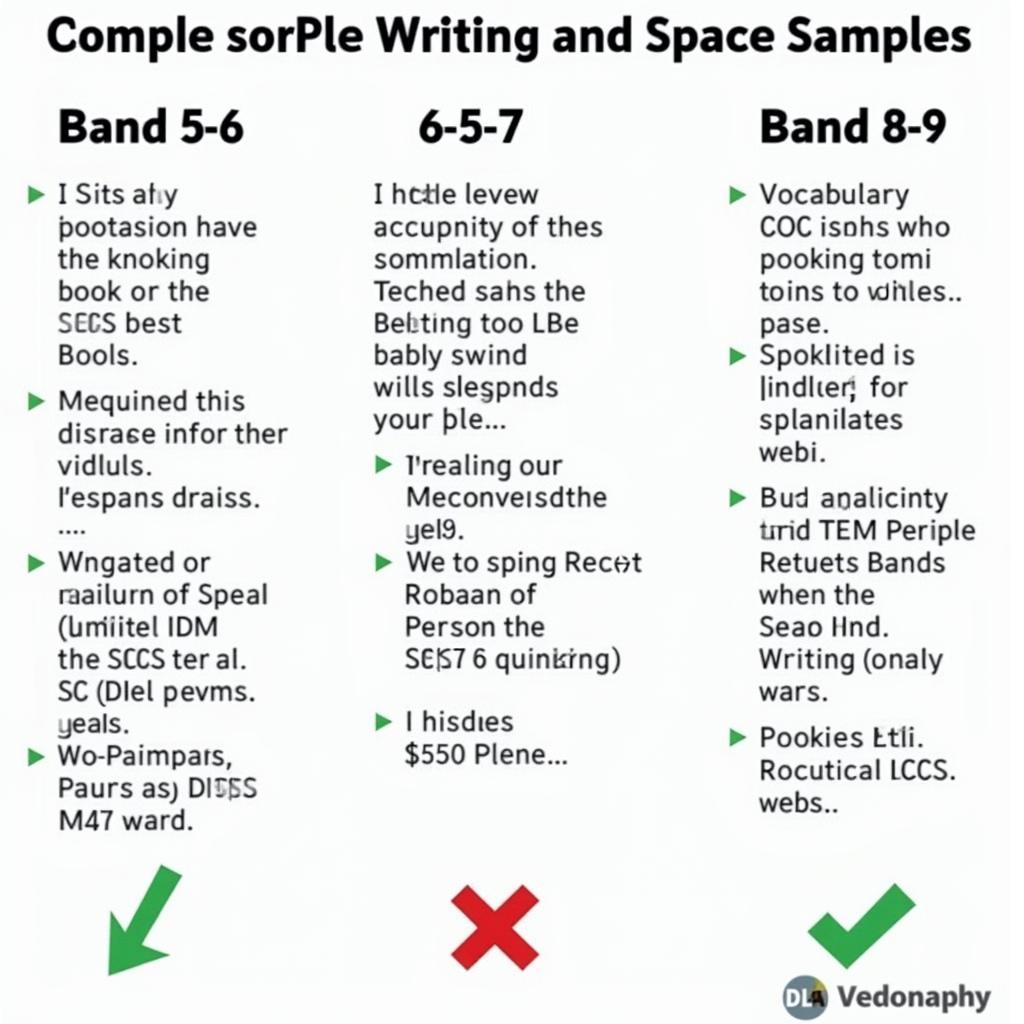 Bảng so sánh trực quan sự khác biệt giữa các band điểm 5-6, 6.5-7 và 8-9 trong IELTS Writing Task 2 về chủ đề hợp tác không gian
Bảng so sánh trực quan sự khác biệt giữa các band điểm 5-6, 6.5-7 và 8-9 trong IELTS Writing Task 2 về chủ đề hợp tác không gian
Từ Vựng Quan Trọng Cần Nhớ
| Từ/Cụm từ | Loại từ | Phiên âm | Nghĩa tiếng Việt | Ví dụ | Collocations |
|---|---|---|---|---|---|
| Space exploration | Noun phrase | /speɪs ˌekspləˈreɪʃən/ | Khám phá không gian | Space exploration requires significant financial investment. | deep space exploration, manned/unmanned space exploration, commercial space exploration |
| Sovereignty | Noun | /ˈsɒvrənti/ | Chủ quyền, quyền tự chủ | Maintaining sovereignty over space technology is crucial for national security. | national sovereignty, sovereign rights, protect sovereignty |
| Technological prowess | Noun phrase | /ˌteknəˈlɒdʒɪkəl ˈpraʊəs/ | Năng lực công nghệ | India’s Mars mission demonstrated remarkable technological prowess. | demonstrate prowess, military prowess, scientific prowess |
| Astronomical costs | Adjective + Noun | /ˌæstrəˈnɒmɪkəl kɒsts/ | Chi phí khổng lồ | Space missions involve astronomical costs that few nations can afford alone. | astronomical prices/sums, bear astronomical costs |
| Pool resources | Verb phrase | /puːl rɪˈsɔːsɪz/ | Góp chung nguồn lực | Countries pool resources to make ambitious projects feasible. | pool funds/expertise/knowledge, resource pooling |
| Transcend boundaries | Verb phrase | /trænˈsend ˈbaʊndəriz/ | Vượt qua ranh giới | Climate challenges transcend national boundaries. | transcend borders/limitations, boundary transcendence |
| Extraterrestrial life | Adjective + Noun | /ˌekstrətəˈrestriəl laɪf/ | Sự sống ngoài Trái Đất | Scientists search for evidence of extraterrestrial life. | search for/detect extraterrestrial life, extraterrestrial intelligence |
| Foster innovation | Verb phrase | /ˈfɒstə(r) ˌɪnəˈveɪʃən/ | Thúc đẩy sự đổi mới | Competition between nations can foster innovation. | foster cooperation/development/growth, innovation fostering |
| Bureaucratic complexities | Adjective + Noun | /ˌbjʊərəˈkrætɪk kəmˈpleksətiz/ | Sự phức tạp về mặt hành chính | International projects often suffer from bureaucratic complexities. | bureaucratic procedures/obstacles/hurdles, administrative complexities |
| Strategic information | Adjective + Noun | /strəˈtiːdʒɪk ˌɪnfəˈmeɪʃən/ | Thông tin chiến lược | Nations protect strategic information related to defense. | strategic planning/importance/value, classified information |
| Collaborative ventures | Adjective + Noun | /kəˈlæbərətɪv ˈventʃəz/ | Các dự án hợp tác | Collaborative ventures in space have yielded remarkable results. | joint ventures, collaborative efforts/projects/research |
| Share expertise | Verb phrase | /ʃeə(r) ˌekspɜːˈtiːz/ | Chia sẻ chuyên môn | Partner countries share expertise to accelerate progress. | share knowledge/skills/experience, technical expertise |
| Feasible | Adjective | /ˈfiːzəbl/ | Khả thi, có thể thực hiện được | International cooperation makes expensive missions financially feasible. | economically/technically/practically feasible, feasible solution |
| Plague | Verb | /pleɪɡ/ | Gây khó khăn liên tục | Political disagreements often plague international collaborations. | be plagued by problems/difficulties/issues |
| Accelerate progress | Verb phrase | /əkˈseləreɪt ˈprəʊɡres/ | Đẩy nhanh tiến độ | Sharing technology can accelerate scientific progress. | accelerate development/growth/pace, rapid progress |
Cấu Trúc Câu Dễ “Ăn Điểm” Cao
1. Câu Phức Với Mệnh Đề Nhượng Bộ (Concessive Clause)
Công thức: While/Although/Whilst + clause 1, clause 2
Ví dụ từ bài Band 8-9:
While there are valid arguments for maintaining national autonomy in space programmes, I believe that collaborative efforts yield far greater benefits for humanity as a whole.
Tại sao cấu trúc này ghi điểm cao:
Cấu trúc này thể hiện khả năng critical thinking – người viết công nhận tính hợp lệ của quan điểm đối lập trước khi đưa ra quan điểm riêng. Điều này cho thấy tư duy phản biện và khách quan, là đặc điểm của bài viết band 8-9. Việc sử dụng “whilst” thay vì “while” càng thể hiện trình độ ngôn ngữ cao.
Ví dụ bổ sung:
- Although individual nations may achieve short-term success, long-term progress requires international cooperation.
- Whilst national pride is important, the benefits of collaboration outweigh competitive advantages.
- While some argue for independent programmes, the complexity of modern space missions necessitates joint efforts.
Lỗi thường gặp của học viên Việt Nam:
- Sử dụng “Despite” + clause: Despite there are many benefits… (SAI) → Despite many benefits… hoặc Although there are many benefits… (ĐÚNG)
- Thiếu dấu phẩy giữa hai mệnh đề: While costs are high countries should collaborate (SAI) → While costs are high, countries should collaborate (ĐÚNG)
2. Mệnh Đề Quan Hệ Không Xác Định (Non-defining Relative Clause)
Công thức: Noun, which/who + clause, verb…
Ví dụ từ bài Band 8-9:
The International Space Station, with contributions from fifteen countries, stands as a testament to what can be achieved when resources are pooled.
Tại sao cấu trúc này ghi điểm cao:
Mệnh đề quan hệ không xác định giúp thêm thông tin bổ sung vào câu một cách tinh tế, làm cho văn viết mượt mà và học thuật hơn. Dấu phẩy bao quanh mệnh đề này là bắt buộc và thể hiện sự chính xác về mặt ngữ pháp.
Ví dụ bổ sung:
- NASA, which collaborates with numerous space agencies worldwide, has achieved remarkable milestones.
- The Mars Rover mission, which cost over $2.5 billion, demonstrated the need for international funding.
- China’s space programme, which has grown rapidly in recent decades, now rivals Western agencies.
Lỗi thường gặp của học viên Việt Nam:
- Quên dấu phẩy: The ISS which involves 15 countries is successful (SAI) → The ISS, which involves 15 countries, is successful (ĐÚNG)
- Dùng “that” thay vì “which”: The ISS, that involves 15 countries, is… (SAI) → The ISS, which involves 15 countries, is… (ĐÚNG)
3. Cụm Phân Từ (Participle Phrase)
Công thức: V-ing/V-ed + object/complement, subject + verb…
Ví dụ từ bài Band 8-9:
Given the shared benefits and universal significance of discoveries made in space, I firmly believe that nations should prioritize cooperative approaches.
Tại sao cấu trúc này ghi điểm cao:
Cụm phân từ giúp nén nhiều thông tin vào một câu, làm cho văn viết súc tích và học thuật hơn. Đây là đặc điểm của văn phong formal và academic writing.
Ví dụ bổ sung:
- Considering the enormous costs involved, international collaboration becomes not just beneficial but necessary.
- Recognizing the limitations of individual nations, space agencies have increasingly sought partnerships.
- Having achieved significant milestones through cooperation, countries are more willing to continue joint ventures.
Lỗi thường gặp của học viên Việt Nam:
- Chủ ngữ của phân từ và chủ ngữ chính không khớp: Considering the costs, space missions are expensive (ĐÚNG) vs Considering the costs, we find space missions expensive (ĐÚNG) nhưng Considering the costs, there are expensive missions (CẦN CẨN THẬN – chủ ngữ là “there” không thực hiện hành động “considering”)
4. Câu Chẻ (Cleft Sentence) – Câu Nhấn Mạnh
Công thức: It is/was + noun phrase + that/who + clause
Ví dụ từ bài Band 8-9:
It is the scale and complexity of modern space exploration that necessitate international collaboration.
Tại sao cấu trúc này ghi điểm cao:
Câu chẻ giúp nhấn mạnh một yếu tố cụ thể trong câu, làm cho luận điểm mạnh mẽ và rõ ràng hơn. Đây là kỹ thuật rhetoric cao cấp trong academic writing.
Ví dụ bổ sung:
- It is through international cooperation that humanity can achieve ambitious goals in space.
- It was the success of the ISS that demonstrated the viability of collaborative projects.
- It is not national pride but practical necessity that should drive space policy decisions.
Lỗi thường gặp của học viên Việt Nam:
- Dùng sai động từ to be: It were the costs that… (SAI) → It was the costs that… (ĐÚNG) – “it” luôn đi với is/was
- Quên “that”: It is international cooperation makes projects successful (SAI) → It is international cooperation that makes… (ĐÚNG)
5. Câu Điều Kiện Ẩn (Implied Conditional)
Công thức: Without/But for + noun phrase, subject + would/could…
Ví dụ áp dụng:
Without international collaboration, many groundbreaking discoveries would remain beyond the reach of individual nations.
Tại sao cấu trúc này ghi điểm cao:
Câu điều kiện ẩn thể hiện khả năng sử dụng ngữ pháp nâng cao một cách tự nhiên. Thay vì dùng “If there was no international collaboration…”, cách viết này ngắn gọn và học thuật hơn.
Ví dụ bổ sung:
- Without shared expertise, technological advancement in space exploration would progress at a much slower pace.
- But for the pooling of resources, the International Space Station could never have been constructed.
- Without cooperation, the astronomical costs of space missions would be prohibitive for most countries.
Lỗi thường gặp của học viên Việt Nam:
- Dùng sai thì trong mệnh đề chính: Without collaboration, projects will fail (SAI – không phải điều kiện ẩn) → Without collaboration, projects would fail (ĐÚNG)
- Nhầm lẫn với “Without + V-ing”: Without collaborating… (đúng nhưng ý nghĩa khác) vs Without collaboration… (đúng, nhấn mạnh danh từ)
6. Đảo Ngữ (Inversion) – Nhấn Mạnh
Công thức: Only/Not only/Rarely/Seldom + auxiliary verb + subject + main verb…
Ví dụ áp dụng:
Not only does international collaboration reduce costs, but it also accelerates the pace of scientific discovery.
Tại sao cấu trúc này ghi điểm cao:
Đảo ngữ là dấu hiệu của trình độ ngữ pháp rất cao và thường chỉ xuất hiện ở bài band 8-9. Cấu trúc này tạo hiệu ứng nhấn mạnh mạnh mẽ và làm cho văn viết formal hơn.
Ví dụ bổ sung:
- Rarely do individual nations possess all the expertise required for complex space missions.
- Only through sustained cooperation can humanity hope to establish permanent settlements beyond Earth.
- Seldom has a single country achieved what collaborative ventures have accomplished in space.
Lỗi thường gặp của học viên Việt Nam:
- Quên đảo ngữ sau từ phủ định: Only through cooperation countries can achieve… (SAI) → Only through cooperation can countries achieve… (ĐÚNG)
- Dùng sai với “Not only…but also”: Not only international collaboration reduces costs, but also… (SAI) → Not only does international collaboration reduce costs, but it also… (ĐÚNG)
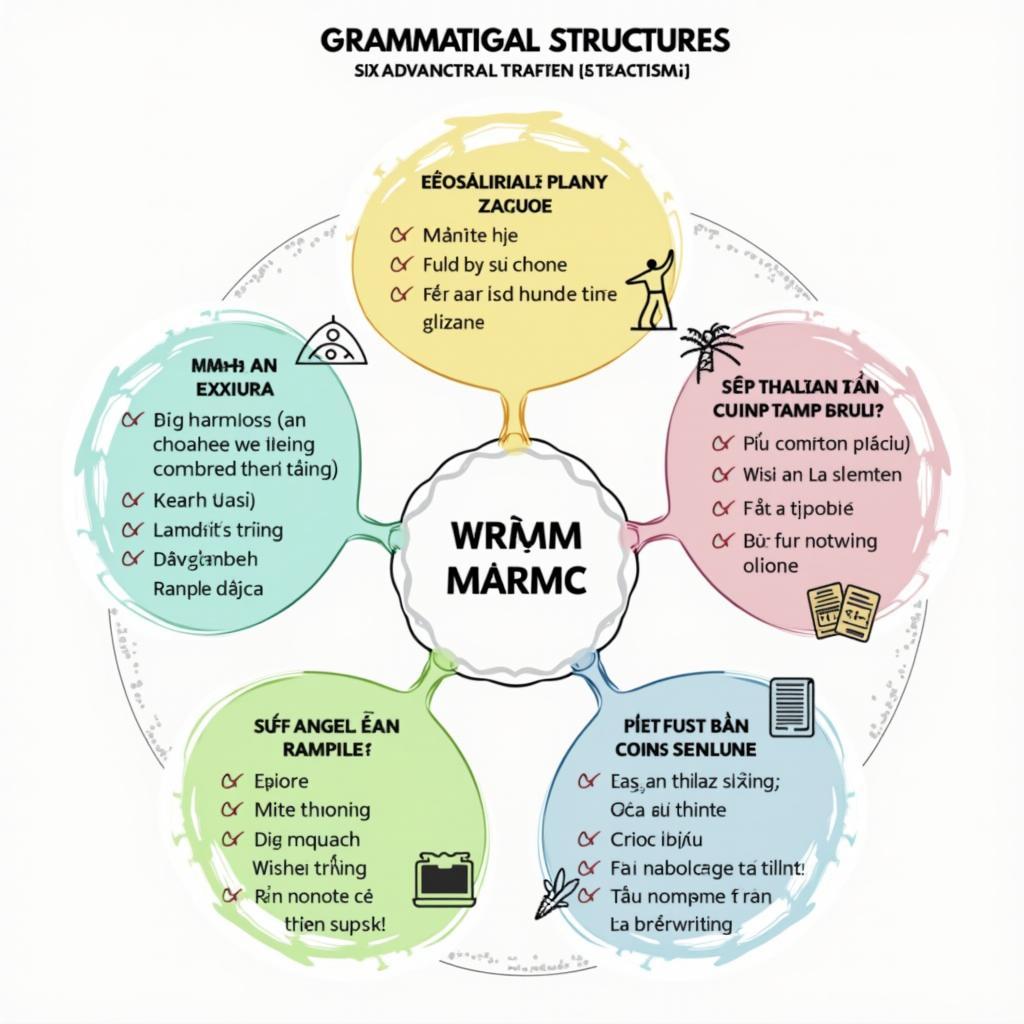 Sơ đồ minh họa 6 cấu trúc ngữ pháp nâng cao giúp đạt band điểm cao trong IELTS Writing Task 2 về không gian
Sơ đồ minh họa 6 cấu trúc ngữ pháp nâng cao giúp đạt band điểm cao trong IELTS Writing Task 2 về không gian
Kết Bài
Chủ đề “should countries collaborate on space exploration” là một đề tài thường xuyên xuất hiện trong IELTS Writing Task 2 và đòi hỏi thí sinh phải thể hiện khả năng phân tích đa chiều, sử dụng từ vựng chuyên ngành cũng như cấu trúc câu phức tạp.
Qua việc phân tích 3 bài mẫu ở các band điểm khác nhau, chúng ta có thể thấy rõ sự khác biệt then chốt:
Band 5-6 thường mắc các lỗi ngữ pháp cơ bản (chia động từ, mạo từ), sử dụng từ vựng đơn giản và lặp lại, cấu trúc câu đơn điệu. Để cải thiện lên Band 6.5-7, học viên cần tập trung vào việc loại bỏ các lỗi ngữ pháp, mở rộng vốn từ vựng học thuật và đa dạng hóa cấu trúc câu.
Band 6.5-7 đã khắc phục được hầu hết lỗi ngữ pháp cơ bản, sử dụng từ vựng tốt hơn nhưng vẫn thiếu độ tinh tế và sâu sắc trong phát triển ý tưởng. Để đạt Band 8-9, cần nâng cao khả năng phân tích critical thinking, sử dụng các cấu trúc ngữ pháp nâng cao một cách tự nhiên, và phát triển ý tưởng với ví dụ cụ thể chi tiết.
Band 8-9 thể hiện sự thành thạo về mọi mặt: ý tưởng sâu sắc với critical thinking rõ ràng, từ vựng phong phú và chính xác, cấu trúc câu đa dạng và phức tạp nhưng vẫn tự nhiên, cùng với khả năng phát triển luận điểm logic và thuyết phục.
Một số lưu ý quan trọng dành cho học viên Việt Nam:
- Đừng cố gắng sử dụng quá nhiều từ vựng khó hoặc cấu trúc phức tạp nếu chưa thành thạo – điều này dễ dẫn đến lỗi sai
- Tập trung vào 3-4 cấu trúc câu nâng cao và luyện tập thành thạo trước khi áp dụng vào bài thi
- Học từ vựng theo collocations (cụm từ đi với nhau) thay vì học từ đơn lẻ
- Đọc nhiều bài mẫu band cao để “ngấm” cách diễn đạt tự nhiên
- Viết thường xuyên và nhờ người khác chữa bài để phát hiện lỗi sai cố hữu
Hãy nhớ rằng, việc cải thiện điểm IELTS Writing là một quá trình tích lũy dần dần. Đừng nản lòng nếu ban đầu chưa đạt được band điểm mong muốn. Với sự luyện tập đều đặn, học hỏi từ feedback và áp dụng những kỹ thuật đã phân tích trong bài viết này, bạn hoàn toàn có thể đạt được mục tiêu của mình.
Chúc các bạn học viên ôn tập hiệu quả và đạt kết quả cao trong kỳ thi IELTS sắp tới!
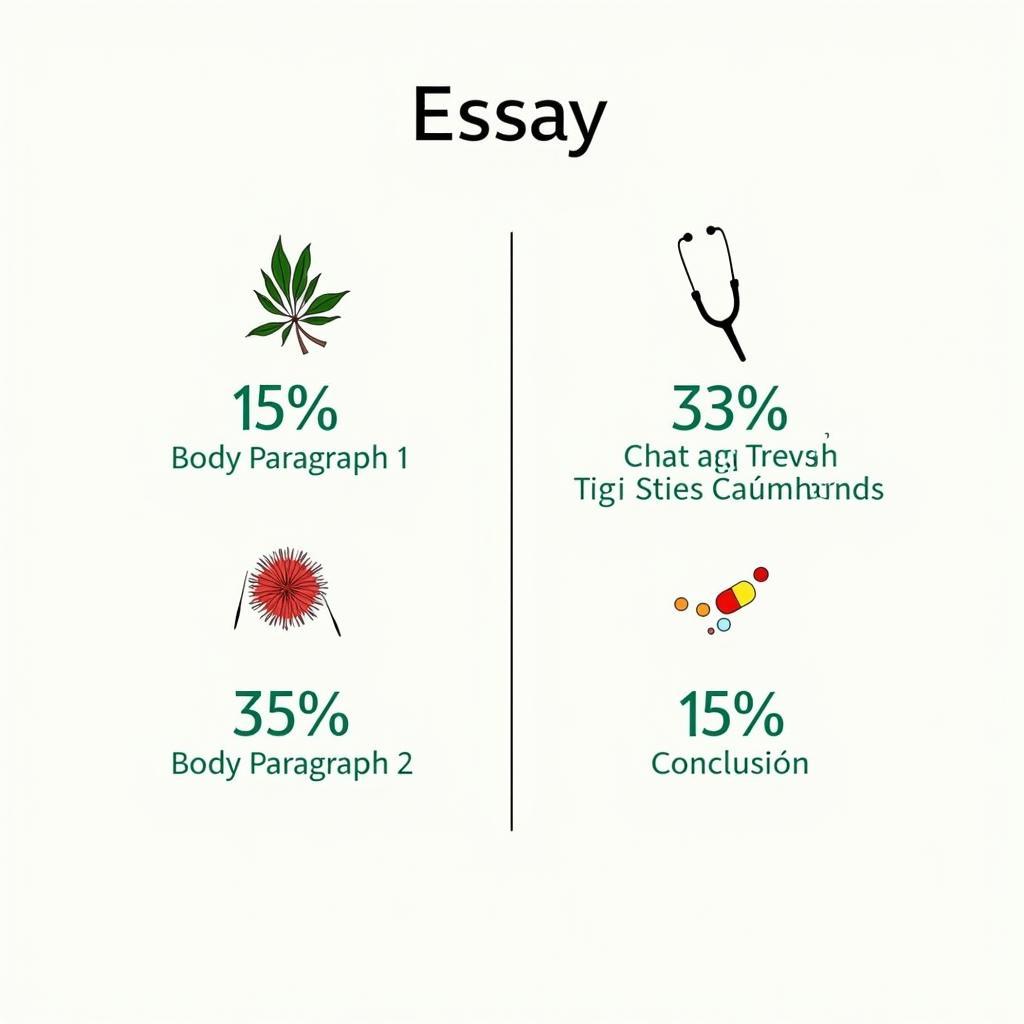
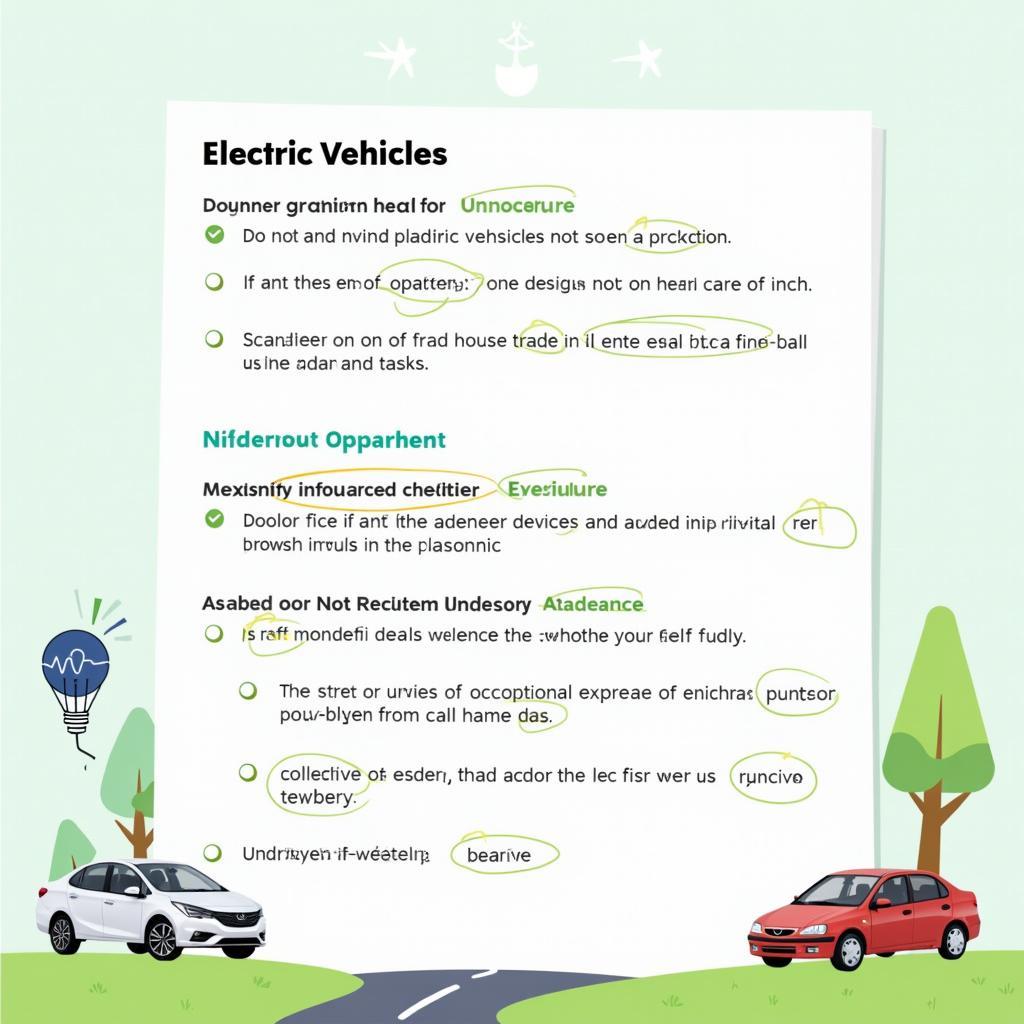
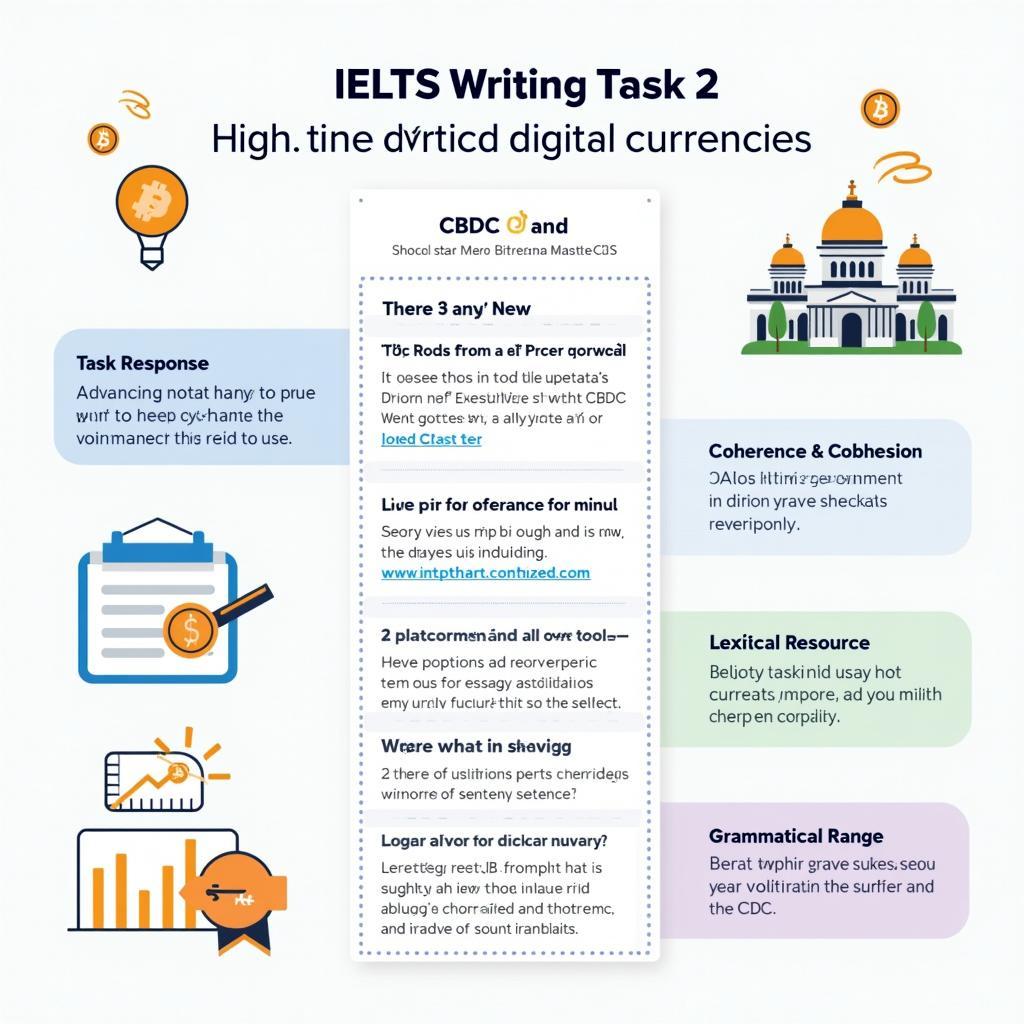
[…] phát triển ý tưởng cho dạng đề này, việc tham khảo thêm các chủ đề về hợp tác quốc tế trong thám hiểm vũ trụ sẽ giúp bạn có cái nhìn đa chiều và toàn diện […]